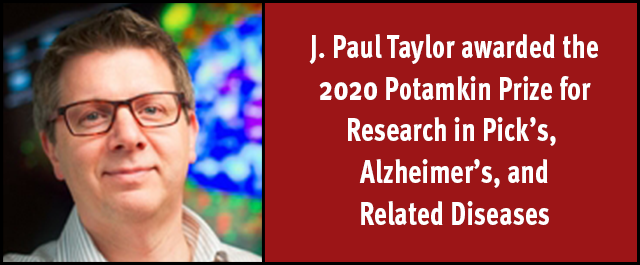PRESS & NEWS
Paul Taylor Wins 2020 Potamkin Prize for His FTD Research: Spring 2020

J. Paul Taylor, M.D, Ph.D., was awarded the 2020 Potamkin Prize for Research in Pick’s, Alzheimer’s, and Related Diseases on April 29, 2020. The $100,000 award recognizes his contributions to the study of amyotrophic lateral sclerosis (ALS), frontotemporal dementia (FTD), and other neurodegenerative disorders. Dr. Taylor currently serves as the chair of the Cell & Molecular…
J. Paul Taylor, M.D, Ph.D., was awarded the 2020 Potamkin Prize for Research in Pick’s, Alzheimer’s, and Related Diseases on April 29, 2020. The $100,000 award recognizes his contributions to the study of amyotrophic lateral sclerosis (ALS), frontotemporal dementia (FTD), and other neurodegenerative disorders.
Dr. Taylor currently serves as the chair of the Cell & Molecular Biology Department at St. Jude Children's Research Hospital in Memphis, Tennessee. Potamkin Philanthropies awarded him the prize in a virtual ceremony hosted by the American Brain Foundation.
In accepting his award via Zoom, Dr. Taylor announced a new translational initiative to accelerate research into neurodegenerative diseases, based on the same St. Jude model that has been successful in finding treatments for pediatric cancer.
As a neurologist, Dr. Taylor grew increasingly frustrated at the lack of effective treatments for his patients, so he began to devote more time to basic research. His work led to the identification of genetic variants in the gene for valosin-containing protein and in the genes for the RNA-binding proteins hnRNPA2B1 and hnRNPA1, all of which increase a person’s risk for developing neurodegenerative conditions such as Parkinsonism, ALS, FTD, and Paget’s disease (Mar 2013 news; Mar 2013 news).
Dr. Taylor recognized that these genetic variants accelerated a process called liquid-liquid phase separation (LLPS), whereby proteins condense into liquid droplets inside the cytoplasm, much like a yolk isolates itself inside the white of an egg. The recognition of this phenomenon spawned a new field of study. Scientists went on to find that a wide range of proteins linked to neurodegeneration can undergo LLPS, including the ALS/FTD proteins FUS and TDP-43, as well as tau, which forms the neurofibrillary tangles found in Alzheimer’s disease and some types of FTD (May 2017 news).
While LLPS is the biological process by which RNA stress granules and the nucleolus form, Dr. Taylor recognized that these droplets can also create the ideal environment for irreversible aggregation of protein (Oct 2015 news).
Dr. Taylor’s group went on to show that ALS mutations in TDP-43 scupper the transport of essential RNA granules, and that poly-dipeptide repeats generated by a hexanucleotide expansion in the C9ORF72 ALS/FTD gene impair assembly of these membrane-less organelles (Feb 2014 news; Oct 2016 news). With Rosa Rademakers at the Mayo Clinic in Jacksonville, Florida, he found that mutations in another RNA-binding protein, TIA1, increase the risk for ALD/FTD, and these variants also promote LLPS (Aug 2017 news).
In a collaboration with Jim Shorter’s group at the University of Pennsylvania, Philadelphia, he reported that nuclear import proteins act as “disaggregases” to break down these liquid organelles. This is now an active area of research for therapeutic approaches (Apr 2018 news).
Together we can find a cure for ftd
The FTD Disorders Registry is a powerful tool in the movement to create therapies and find a cure. Together we can help change the course of the disease and put an end to FTD.
Your privacy is important! We promise to protect it. We will not share your contact information.



